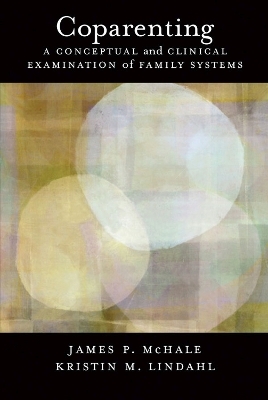
Coparenting
American Psychological Association (Verlag)
978-1-4338-0991-0 (ISBN)
James McHale defines coparenting as “an enterprise undertaken by two or more adults who together take on the care and upbringing of children for whom they share responsibility.” Coparents may be members of the child’s extended family, divorced or foster parents, or other specialized caregivers.
This landmark book was written to encourage good coparenting as a powerful support for at-risk children’s social, emotional, and behavioral needs.
Part I examines the concepts, theories, and empirical research underlying this dynamic socialization force characteristic of all family systems. Part II explores clinical applications—the various assessments and interventions that promote coparenting. The result is essential reading for those interested in the welfare of children.
James P. McHale, PhD, is chair of the Psychology Department at the University of South Florida, St. Petersburg. He received his doctoral degree in clinical psychology from the University of California, Berkeley, and trained as a family therapist in both Palo Alto, California, and Philadelphia, Pennsylvania. His research studies of early infant, child, and family adjustment, grant-supported by the National Institutes of Health since 1996, have investigated the nature of children's interpersonal experiences in their families. His theoretical contributions have sought to instigate fresh, inclusive dialogues about how adults in diverse family systems collaborate to support children's care and upbringing. In 2004, Dr. McHale's Decade of Behavior Lecture for the World Association for Infant Mental Health, "When Infants Grow Up in Multiperson Relationship Systems" (published in Infant Mental Health Journal, 2007), championed a paradigm shift in the field of infant mental health, and in 2007 his book Charting the Bumpy Road of Coparenthood received the Irving B. Harris National Book Award of the Zero-to-Three Press. Professionally, he has provided coparenting trainings for the judiciary, physicians, child care professionals, child welfare advocates and professionals, Healthy Start and Early Head Start care coordinators, foster parents, postdivorce parenting coordinators, statewide fatherhood programs, and other contingents that serve infants and toddlers. Dr. McHale directs the University of South Florida, St. Petersburg's Family Study Center and is a member of the boards of directors for the Florida Association for Infant Mental Health and the Healthy Start Coalition of Pinellas, Inc. Kristin M. Lindahl, PhD, is an associate professor in the Department of Psychology at the University of Miami, Florida. She received her doctoral degree in clinical psychology, specializing in child clinical psychology, from the University of Denver, Colorado. After completing her internship at Children's Hospital Boston, she accepted a faculty position at the University of Miami, which she has held since 1992. Her research focuses on systemic family functioning and the impact of difficulties in marital and parent–child subsystems, as well as the whole family, on child adaptation. She has been a principal investigator or coprincipal investigator on several National Institute of Mental Health-funded studies examining how family subsystems are interrelated, including how marital conflict is related to family cohesion and parenting strategies, and the role of family functioning on parent and child adaptation to a son or daughter's disclosure of gay or lesbian identity. She has published and presented widely on topics related to coparenting, observational coding of family interactions, and dyadic and triadic family dynamics as they relate to child functioning.
Contributors
Acknowledgments
Introduction: What Is Coparenting?
James P. McHale and Kristin M. Lindahl
I. Theory and Empirical Research
Coparenting in Diverse Family Systems
James P. McHale and Karina Irace
Coparenting in Two-Parent Nuclear Families
Sarah C. Mangelsdorf, Daniel J. Laxman, and Allison Jessee
Coparenting in Extended Kinship Systems: African American, Hispanic, Asian Heritage, and Native American Families
Deborah J. Jones and Kristin M. Lindahl
Coparenting in Fragile Families: Understanding How Parents Work Together After a Nonmarital Birth
Marcia J. Carlson and Robin S. Högnäs
Coparenting in Families With Adolescent Mothers
Laura D. Pittman and Rebekah Levine Coley
Coparenting Among Lesbian and Gay Couples
Charlotte J. Patterson and Rachel H. Farr
II. Applications: Assessment and Interventions to Promote Coparenting
Assessing Coparenting
James P. McHale
Coparenting Interventions for Expecting Parents
Mark E. Feinberg and Kari-Lyn Sakuma
Coparenting Interventions for Unmarried Parents
Francesca Adler-Baeder and Karen A. Shirer
Coparenting in Family–Infant Triads: The Use of Observation in Systemic Interventions
France Frascarolo, Elisabeth Fivaz, and Nicolas Favez
Coparenting After Divorce: Paving Pathways for Parental Cooperation, Conflict Resolution, and Redefined Family Roles
Marsha Kline Pruett and Tracy Donsky
Coparenting Practices Among Families in the Foster Care System
Daniela Montalto and L. Oriana Linares
Coparenting in Multigenerational Family Systems: Clinical and Policy Implications
James P. Gleeson, Anne L. Strozier, and Kerry A. Littlewood
Afterword: Coparenting as Paradigm
James P. McHale
Index
About the Editors
| Erscheint lt. Verlag | 30.7.2011 |
|---|---|
| Verlagsort | Washington DC |
| Sprache | englisch |
| Maße | 178 x 254 mm |
| Themenwelt | Sachbuch/Ratgeber ► Gesundheit / Leben / Psychologie ► Familie / Erziehung |
| Geisteswissenschaften ► Psychologie ► Familien- / Systemische Therapie | |
| Medizin / Pharmazie ► Medizinische Fachgebiete ► Psychiatrie / Psychotherapie | |
| Sozialwissenschaften ► Soziologie | |
| ISBN-10 | 1-4338-0991-5 / 1433809915 |
| ISBN-13 | 978-1-4338-0991-0 / 9781433809910 |
| Zustand | Neuware |
| Haben Sie eine Frage zum Produkt? |
aus dem Bereich


